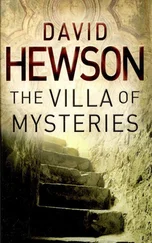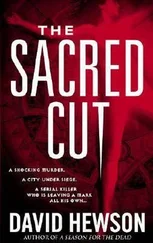“Correct,” Peroni replied, eyeing a couple of plainclothes he recognised who were hanging around near the restaurant looking shifty, taking furtive sips at two small beers they’d secreted on the tables there.
“This is crazy,” Zecchini complained. “Those shots weren’t more than a few minutes ago. How’d they get here so fast?”
Peroni had run through that one already. “The local Questura’s just round the corner. I imagine they would have heard.”
All the same, it was pretty swift work.
The monk had pulled a disgusted face when he talked about the men who’d been assigned to Randazzo. Peroni felt the same way when he ran into this pair in the Questura.
“Also, unless I’m mistaken, they were supposed to stop something like this from happening. Hey! Lavazzi!”
One of them turned. The man looked scared.
“A word, please.”
Lavazzi didn’t move, just stayed there, clutching his beer, looking around for help.
The plainclothes man who was placing a plastic sheet over the corpse swore malevolently, finished the job, then strode over to meet them. Peroni dimly recognised him: one of the faceless people inside the main Piazzale Roma Questura, a local commissario who never so much as gave them a second glance all the time they worked in Venice.
“You people really should find better ways to spend your time. Now.” He spoke with a flat, monotonous northern accent that wasn’t local, or welcoming.
Zecchini reached into his jacket and flashed his badge.
“Carabinieri,” he said, nodding at the sheet on the ground. “We’ve got a warrant to interview this man.”
“Sadly, it seems you came a little late.” Some medics had turned up. They were running a gurney along the paving stones, looking as if they were ready to move the body. Peroni thought of what had happened on the Isola degli Arcangeli. Everything got taken care of so very, very quickly.
“You should wait until your pathologist arrives,” he said. “At least look as if you’re trying.”
The anonymous commissario came close and gave him an ugly look. He was a short man with a walrus moustache and black, lifeless eyes.
“Shut up, Peroni,” he replied. “This is our business, not yours. And we are trying, by the way. In ways we never had to until you and your Roman buddies turned up. What is it with you people? That this kind of crap just follows you around?”
Peroni wondered how long he’d have to stay in Venice before he broke the habit of a lifetime and started punching people.
“Like you said, Commissario,” he replied calmly. “This is your business. It was your business long before we happened to come along. I’m sure it will be that way long after we’re gone. Look to your own rotten apples. Not to us.”
“You’re gone now!” the officer bellowed, livid. “You’re no longer attached to this Questura. If you start poking your ugly nose in where it doesn’t belong, I’ll throw you in a cell. Understood?” Then he glanced at Zecchini. “The same goes for you. This is a state police case, nothing to worry the Carabinieri.”
“We have a warrant!” Zecchini said again, taking the papers out of his pocket.
“You can’t serve a warrant on a dead man!” the commissario yelled.
“They can ask why the hell he’s dead,” Peroni interjected, “when you were supposed to have men protecting him. Or is that not a question anyone’s supposed to raise outside your little circle of friends?”
Peroni felt a little guilty about that last crack. The Questura wasn’t above a little petty corruption. He didn’t doubt that. But some general collusion in the assassination of a colleague, even one as little loved as Gianfranco Randazzo, was just a step too far.
“Look,” he continued, fighting to sound amenable, “I’m sorry I lost my temper. I’m just saying, maybe we can help.”
“I don’t want your help.”
This man was scared too, Peroni suddenly realised. He probably didn’t even know why. All he knew was that he had to keep everything tight and organised and secret until someone else made the decision about what to do next.
“I’m just saying this,” Peroni answered. “You’ve got a dead colleague on your hands now. A man who was under suspension. A man for whom the Carabinieri had a warrant on the grounds of art smuggling.”
This last information made the moustache twitch a little. The man’s name came back to Gianni Peroni.
“Commissario Grassi. Why are we arguing? I know your accent. You’re Milanese. Not from here. The Venetians don’t give a shit about you any more than they do about me. We’re all expendable. Maggiore Zecchini here too. If the carpet turns out to be too small to sweep all this mess under, who do you think gets the blame? The Venetians? Or the likes of us?”
Peroni watched the reaction on the man’s face and reflected upon the plain fact that a craven man could be as little use as a crooked one.
“What the hell are you talking about, Peroni? They all said you people were nuts. This is a crime on my watch. It gets investigated by me, the way I say.”
“You’ve got a dead commissario. You’ve got two murders on that weird island out there. And some corpse in the morgue put there by this man . . .”
He nodded at the gurney. To his disbelief, they really were lifting Zecchini’s body and placing it on the stretcher.
“Do you honestly think no one outside Venice is going to be watching all this and wondering?”
Grassi thought it over. “Wondering what?”
It was Zecchini who answered. “Wondering whether it isn’t, perhaps, time that someone from elsewhere came and took a look at what’s been going on here. People are starting to talk, Commissario. It gets hard to stop after a while. Sometimes a man has to think of his own career. And let’s face it . . .”
Zecchini shrugged. He looked a little more confident again. Peroni was glad to see that. Some awkward grain of doubt had been bugging the Carabinieri man ever since Costa had pushed him into this game.
“We’re here,” the major added. “Doesn’t that give you something to think about?”
“Lots,” Grassi agreed, nodding. “But principally this: You’re here to interview a dead man. Peroni’s here because he’s an idiot who can’t keep his ugly nose out of something that doesn’t concern him. Neither of you have any right or reason to occupy my time. Furthermore, if you do that, I will, I promise, become very, very pissed off indeed.”
The gurney wheels squeaked across the paving stones. They really were removing the corpse.
“So you’ve got some suspects for this, Commissario?” Peroni asked wryly.
“Good police officers make enemies all the time,” Grassi answered, then gave him a withering look. “Lousy ones too, sometimes. Best you remember that.”
With that, Grassi turned on his heels and went back to the gurney and the corpse, back to barking routine orders at the SOCOs who stood around lazily putting on their bunny suits like men wishing they could bunk off for the day.
Zecchini watched him go, shaking his head. “I need a beer,” he moaned. “Anyone care to join me?”
“I’m buying,” Peroni said.
The Carabinieri man turned and gave him some kind of look Peroni didn’t quite understand. Furtive maybe. Or just filled with some impending guilt.
“No,” Zecchini told Peroni. “This one’s on me. Best find your partner too. We need to talk.”

WHEN HE CAME TO, DANIEL FORSTER WAS STILL THERE, gun by his side, barrel not quite in Costa’s face. Costa raised his fingers to the site of the blow. There was blood there. He winced.
Читать дальше













